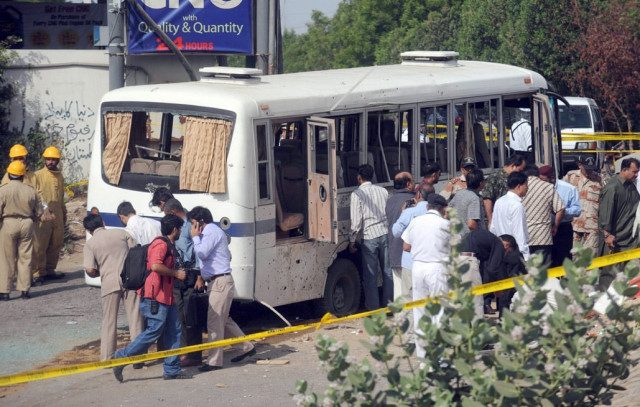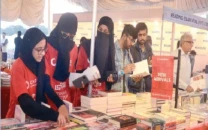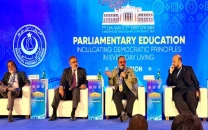Three attacks, 48 hours
Five killed, seven injured in latest bombing; warning of a fourth hit on Friday (today).

Despite the precautionary advice, the buses were used on Thursday morning, sources within the navy say. And terror struck – for the third time in 48 hours. At least five people, including four sailors, were killed and seven suffered injuries in the latest attack on a navy bus on Thursday. The bus was getting onto Karachi’s major thoroughfare, Shahrae Faisal, from PNS Mehran Aviation base’s entry at just past 8 am when a remote-controlled bomb went off beside it.
“An investigation will be conducted into the violation,” a senior navy officer said. He added that all Bahria schools and colleges will remain closed for at least a week.
The officer, who is familiar with the investigations at the Pakistan Navy’s end, said that, as of yet, there have been no major breakthroughs. However, the navy has received an intelligence report that there could be another attack on the force on Friday (today). “Late evening, we got information that a green coloured jeep was on its way from Hub towards Karachi that is loaded with at least five or six improvised explosive devices (IEDs),” he said.
There were eleven passengers on board the ill-fated bus, including two officers. The bus was on its way to the Pakistan Naval Dockyard, but was struck by a bomb planted near a sealed water valve container as it barely travelled 20 yards away from the PNS Mehran Aviation base’s entry gate.
The blast occurred in a side lane next to Shahrae Faisal near the Karsaz bridge was just metres away from the spot where the caravan of Pakistan Peoples Party slain chairperson Benazir Bhutto had come under attack on October 18, 2007.
The dead included one chief petty officer, two petty officers and one sailor. A civilian Naveed, 24, from North Karachi also died as he serviced an Alto car that broke down near the ill-fated bus.
CCPO Karachi Saud Mirza said the nature of the bomb was similar to the ones used in the Defence and Baldia attacks. SSP Investigation East Niaz Khosa said: “In the Baldia blast, the vehicle was speeding, which shows that only an expert could have targeted it.” The roadside bomb weighed at least 7kgs, he said, adding that the materials used in the bombs were all locally made.
He added that the navy was considered a soft target because its personnel had to travel through the city to reach the harbour as opposed to, for example, PAF staff that stays within its compound.
Bomb Disposal Unit inspectors at the site said high grade explosives were used in the attack, but they could not tell whether they were TNT or C4 type until the report comes back from their labs.
Who did it?
Chief Minister Sindh Qaim Ali Shah was on his guard when he was asked to name the militant group behind the attacks given that the Tehreek-e-Taliban Pakistan (TTP) and Balochistan Liberation Front (BLF) had both claimed the Defence and Baldia bombings. “Some groups claim attacks in order to divert the attention of the investigators,” he said.
SSP Special Investigation Unit Raja Umer Khattab, who until two days ago, was ever ready to spin his theory that the planted bomb used in the motorcycle attack in Defence was similar to the one used in the Chehlum blast in the city a year ago, said: “All I can say at this point is that terrorists were involved in the attack.”
Navy officers investigating the attack admit that they too, like their police counterparts, were in the dark about the group involved. However, they said it was hard for them to digest that the TTP was involved since they could not find the misguided religious zeal usually associated with such terrorists who prefer to die in any of the attacks. They hinted that they were giving more credence to the claim from the Baloch rebels.
Khosa said the police were looking at the Taliban connection more closely since IED-type explosives are mostly used by them in Afghanistan and northern areas.
Analyst Ejaz Haider said it was possible that both claims of the TTP and BLF may not be mutually exclusive. He said there is increasing evidence that the BLF has strong links with the Sunni militant group Jundullah that is waging a battle against the Shia-state Iran. The Balochistan-based Jundullah is known to have strong links with the anti-Shia militant group Lashkar-e- Jhangvi, which Haider says in turn comes under the umbrella of the TTP. Other analysts and investigators disagree with Ejaz’s assertions calling them far-fetched.
Meanwhile, a navy press release said “Pakistan Navy has been attempted on by ill-minded elements whose nefarious motives aim at deterring the resolve of the nation to fight the menace of terrorism.”
Published in The Express Tribune, April 29th, 2011.



















COMMENTS
Comments are moderated and generally will be posted if they are on-topic and not abusive.
For more information, please see our Comments FAQ